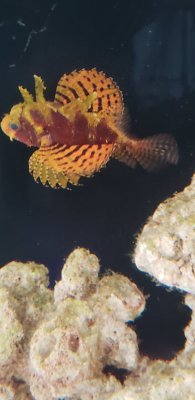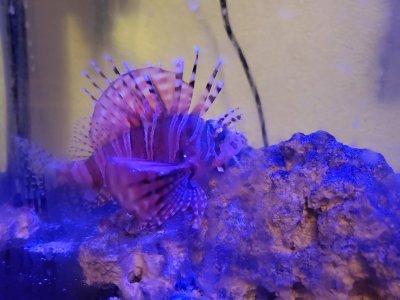- Joined
- Jul 3, 2016
- Messages
- 6,797
- Reaction score
- 8,654
As my research into how long lions are being kept alive in captivity disturbed and disappointed me, I decided to post a few of my observations that has allowed me to keep them for several years or more.
Source; know your source, it is not a good idea to get any lion from a source that runs copper in their system. While possible to escape permanent organ damage if transported through very quickly, it will be more of an exception if a lion from this source lives more than a year or so. Extended antibiotic treatment also reins havoc on the internal organs, and I've seen the same decreased life span of those treated as such.
QT/observation and treatment for internal parasites and worms. It will be an exception if the lion doesn't arrive with some sort of internal parasites or worms, they are often and mostly fed diseased and dying fish along the way of their transport. Initially housing them in a qt or the 1st member of your non reef dt would be wise, as to treat with general cure or a prazi pro/metro combo. You will also need to address their unique and challenging feeding habits.
Treatment and feeding, this will actually go hand in hand. With the exception of the volitan lions, the dwarf and medium species will almost always need to be initially fed live foods. Even if you get a lion from the lfs that is eating dead food, it will likely never be enough to sustain, and almost always will be a restart when you transport them. Dwarf lions eating mysis and such from the water column, is never enough to sustain them long tern, if you are dead set on feeding them dead food only, you will need to target feed them chunks of meaty items. I have found to initially get them eating and fattened up with some live ghosties or feeder guppies then start treatment right away, to be the most effective. After 2-3 days of fattening up, dose the water column with general cure, follow directions of dosage precisely, no need to follow alternative recommendations from internet experts. If the lion does not eat live prey right away, immediately start treatment. The lion should eat the live prey in short order at least within an hour or so, if not they are likely already succumbing to internal parasites or copper poisoning, which the later will be no recovery. If you prefer to do the prazi pro/metro combo instead, the lions must be eating dead food very well, as I have found metro to not be that effective in the water column. Then feeding dead food soaked in metro daily for as long as 2 weeks. General cure has been the best method for me, as most will not be eating dead food adequately enough to get the metro into their system.
DT housing, I've found success and perceived happiness in tanks from a 40B to a 90g. I like to keep the tanks in this range to allow feeding live prey easier to contain, larger tanks get more complicated, and smaller really not recommended. If you are going to keep multiples, a 90g is an excellent choice, nice height to allow higher cliffs for perching and overall just a great multiple predator tank. The 75g is the same footprint as the 90, only not as tall. The 60g is an excellent choice as well, and could likely house 3 of the dwarf/medium lions. The dwarf and medium bodied lions end up around the same overall size in the end, with the exception of the fu being smaller, the fuzzy a little shorter, but really not much difference in real estate needs. I actually prefer the 40B to a 55g, the 55 is too thin for my taste. Also the lions will utilize the width of the tank as much as the length, and the 40B has a great balance between width and length.
Feeding: I have never seen any of the dwarf and medium bodied lions kept for much more than a year being fed a dead only diet, so please consider this among all else. As an exception I did keep a fuzzy for more than 3 years before being rehomed due to an illness on my part. It was a very challenging and dedicated operation to get a balanced substantial dead only diet to fully sustain him for long term.
Source; know your source, it is not a good idea to get any lion from a source that runs copper in their system. While possible to escape permanent organ damage if transported through very quickly, it will be more of an exception if a lion from this source lives more than a year or so. Extended antibiotic treatment also reins havoc on the internal organs, and I've seen the same decreased life span of those treated as such.
QT/observation and treatment for internal parasites and worms. It will be an exception if the lion doesn't arrive with some sort of internal parasites or worms, they are often and mostly fed diseased and dying fish along the way of their transport. Initially housing them in a qt or the 1st member of your non reef dt would be wise, as to treat with general cure or a prazi pro/metro combo. You will also need to address their unique and challenging feeding habits.
Treatment and feeding, this will actually go hand in hand. With the exception of the volitan lions, the dwarf and medium species will almost always need to be initially fed live foods. Even if you get a lion from the lfs that is eating dead food, it will likely never be enough to sustain, and almost always will be a restart when you transport them. Dwarf lions eating mysis and such from the water column, is never enough to sustain them long tern, if you are dead set on feeding them dead food only, you will need to target feed them chunks of meaty items. I have found to initially get them eating and fattened up with some live ghosties or feeder guppies then start treatment right away, to be the most effective. After 2-3 days of fattening up, dose the water column with general cure, follow directions of dosage precisely, no need to follow alternative recommendations from internet experts. If the lion does not eat live prey right away, immediately start treatment. The lion should eat the live prey in short order at least within an hour or so, if not they are likely already succumbing to internal parasites or copper poisoning, which the later will be no recovery. If you prefer to do the prazi pro/metro combo instead, the lions must be eating dead food very well, as I have found metro to not be that effective in the water column. Then feeding dead food soaked in metro daily for as long as 2 weeks. General cure has been the best method for me, as most will not be eating dead food adequately enough to get the metro into their system.
DT housing, I've found success and perceived happiness in tanks from a 40B to a 90g. I like to keep the tanks in this range to allow feeding live prey easier to contain, larger tanks get more complicated, and smaller really not recommended. If you are going to keep multiples, a 90g is an excellent choice, nice height to allow higher cliffs for perching and overall just a great multiple predator tank. The 75g is the same footprint as the 90, only not as tall. The 60g is an excellent choice as well, and could likely house 3 of the dwarf/medium lions. The dwarf and medium bodied lions end up around the same overall size in the end, with the exception of the fu being smaller, the fuzzy a little shorter, but really not much difference in real estate needs. I actually prefer the 40B to a 55g, the 55 is too thin for my taste. Also the lions will utilize the width of the tank as much as the length, and the 40B has a great balance between width and length.
Feeding: I have never seen any of the dwarf and medium bodied lions kept for much more than a year being fed a dead only diet, so please consider this among all else. As an exception I did keep a fuzzy for more than 3 years before being rehomed due to an illness on my part. It was a very challenging and dedicated operation to get a balanced substantial dead only diet to fully sustain him for long term.





















